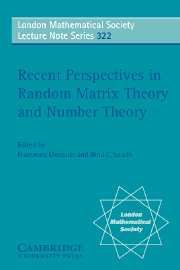Book contents
- Frontmatter
- Contents
- Introduction
- Prime number theory and the Riemann zeta-function
- Introduction to the random matrix theory: Gaussian Unitary Ensemble and beyond
- Notes on pair correlation of zeros and prime numbers
- Notes on eigenvalue distributions for the classical compact groups
- Compound nucleus resonances, random matrices, quantum chaos
- Basic analytic number theory
- Applications of mean value theorems to the theory of the Riemann zeta function
- Families of L-functions and 1-level densities
- L-functions and the characteristic polynomials of random matrices
- Spacing distributions in random matrix ensembles
- Toeplitz determinants, Fisher-Hartwig symbols, and random matrices
- Mock-Gaussian behaviour
- Some specimens of L-functions
- Computational methods and experiments in analytic number theory
- Index
Applications of mean value theorems to the theory of the Riemann zeta function
Published online by Cambridge University Press: 06 January 2010
- Frontmatter
- Contents
- Introduction
- Prime number theory and the Riemann zeta-function
- Introduction to the random matrix theory: Gaussian Unitary Ensemble and beyond
- Notes on pair correlation of zeros and prime numbers
- Notes on eigenvalue distributions for the classical compact groups
- Compound nucleus resonances, random matrices, quantum chaos
- Basic analytic number theory
- Applications of mean value theorems to the theory of the Riemann zeta function
- Families of L-functions and 1-level densities
- L-functions and the characteristic polynomials of random matrices
- Spacing distributions in random matrix ensembles
- Toeplitz determinants, Fisher-Hartwig symbols, and random matrices
- Mock-Gaussian behaviour
- Some specimens of L-functions
- Computational methods and experiments in analytic number theory
- Index
Summary
Abstract
In the first half of these lectures we discuss mean value theorems for functions representable by Dirichlet series and sketch several applications to the distribution of zeros of the Riemann zeta function. These include the clustering of zeros about the critical line, Levinson's result that a third of the zeros are on the critical line, and a conditional result on the number of simple zeros. The second half focuses on mean values of Dirichlet polynomials, particularly “long” ones. We then show how these can be used to investigate the pair correlation of the zeros of the zeta function and to conjecture the sixth and eighth power moments of the zeta function on the critical line.
What is a Mean Value Theorem?
By a mean value theorem we mean an estimate for the average of a function. When F(s) has a convergent Dirichlet series expansion in some half–plane Re s > σ0 of the complex plane, we typically take the average over a vertical segment:
The path of integration here need not lie in this half–plane. For example, we would like to know the size of the integrals
for σ ≥ ½ and k a positive integer. Here F(s) = ζ(s)k and its Dirichlet series converges only for σ > 1.
There are many variations. For example, one can consider a discrete mean value
where the points σr + itr lie in ℂ.
- Type
- Chapter
- Information
- Recent Perspectives in Random Matrix Theory and Number Theory , pp. 201 - 224Publisher: Cambridge University PressPrint publication year: 2005
- 1
- Cited by



